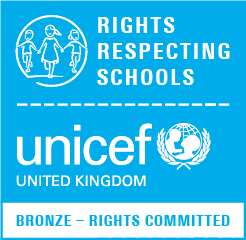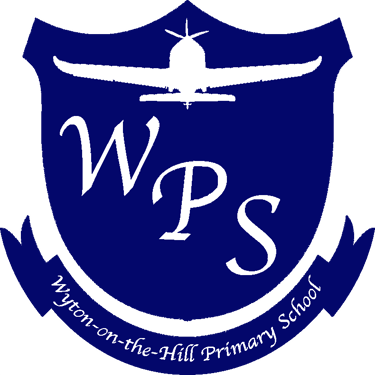At Wyton on the Hill, we are committed to placing the values and principles of the United Nations Convention on the Rights of the Child (UNCRC) at the heart of our policies and practice. It is important to us that children recognise their rights but also learn how to respect and value the rights of others.
Through their experience of an inclusive rights-respecting school community, we want our children to develop the confidence to play an active role in their own learning and to speak and act for the rights of all to be respected locally and globally.
This is why we have chosen to take part in Unicef’s Rights Respecting Schools Award.
What is the Rights Respecting Schools Award?
UNICEF UK believes that the principles and values of the UNCRC (United Nations Convention on the Rights of the Child) should be embedded in the ethos and curriculum of every school. This is the purpose of the Rights Respecting School Award.
The award provides a framework to help schools to use the UNCRC as the basis for their ethos. It is based on principles of equality, dignity, respect, non-discrimination and participation. In a rights respecting school, children learn about their rights and the importance of respecting, protecting and promoting the rights of others - as well as their own!
Children learn to associate rights with needs and distinguish between their rights and ‘wants’. They learn about the content of the UNCRC – the list of rights that all children, everywhere in the world, have. The rights on this list are all the things that children and young people need to make sure they are healthy, happy and safe.
The Rights Respecting Schools Award (RRSA) recognises achievement in putting the UNCRC at the heart of a school’s planning, policies, practice and ethos as outlined in the three RRSA Strands (click here for more information).
A rights respecting school not only teaches about children's rights, but also works hard to model rights and respect in all its relationships: between adults and children, between children themselves, and between adults themselves.
We were successful in achieving UNICEF’s Bronze Award in 2015 and are currently working towards the Silver Rights Respecting Schools Award.
What does RRS look like at Wyton on the Hill?
As well as learning about children’s rights, through school and class assemblies and Rights Respecting days, being a Rights Respecting School shapes our behaviour management. Every class draws up a class charter based on agreed rights, for example Article 12, “respect for the views of the child”, and then lists how adults and children will be able to respect, protect and promote this right. Now that behaviour is understood in this way, there is less need for rules and sanctions.
Our Rights Respecting Steering Group also known as RRS Ambassadors are a group of children from across the school who work to ensure that all members of our school community are made aware of the rights afforded to them through the UNCRC. They also ensure that they model the best way to respect the rights of others, making our school a happier, safer and more respectful place to learn and work.
RRS Class Meetings
Once a fortnight, in class assembly time, our classes hold a meeting to discuss what is working well and what could be improved in our school at the moment. There is also an important issue for debate, which is chosen by our Rights Respecting Ambassadors.
Our RRS Ambassadors meet with the Head teacher once a fortnight to discuss school issues and to decide, by vote on the topic for the next class meeting. In this way, we are able to include children’s views in our decision-making processes, in accordance with Article 12 of the UNCRC and children have had a say in important decisions including:
The design of our new school building
The redesign of our school logo and uniforms
The timing and length of lunch time
Play and lunch break activities and clubs
RRS Days
Each term, we hold a Rights Respecting Day, in which pupils learn about an aspect of their rights. The theme for these days is chosen at the beginning of the year.
Rights Vocabulary
Here are some of the key words we use to help learn about, through and for rights.
Duty Bearers: These are all the people whose responsibility it is to make sure children’s rights are respected. This starts with the government but also includes parents and all school staff.
Equity: The concept that every child deserves to have the support they need to succeed and that this support will look different for each child.
Dignity: The way in which all children should be treated at all times.
The ABCDE of children’s rights:
How can you help?
There are three ways you can support our RRSA approach:
Watch or read age appropriate news and discuss how it relates to children’s rights
Discuss topics your child is studying at school and how they relate to children’s rights
With reference to the summary poster of children’s rights (see below) celebrate when your child gets to enjoy their rights as this really is a cause for celebration
Click here to see Unicef’s summary poster of children’s rights.At Wyton on the Hill, we are committed to placing the values and principles of the United Nations Convention on the Rights of the Child (UNCRC) at the heart of our policies and practice. It is important to us that children recognise their rights but also learn how to respect and value the rights of others.
Through their experience of an inclusive rights-respecting school community, we want our children to develop the confidence to play an active role in their own learning and to speak and act for the rights of all to be respected locally and globally.
This is why we have chosen to take part in Unicef’s Rights Respecting Schools Award.
What is the Rights Respecting Schools Award?
UNICEF UK believes that the principles and values of the UNCRC (United Nations Convention on the Rights of the Child) should be embedded in the ethos and curriculum of every school. This is the purpose of the Rights Respecting School Award.
The award provides a framework to help schools to use the UNCRC as the basis for their ethos. It is based on principles of equality, dignity, respect, non-discrimination and participation. In a rights respecting school, children learn about their rights and the importance of respecting, protecting and promoting the rights of others - as well as their own!
Children learn to associate rights with needs and distinguish between their rights and ‘wants’. They learn about the content of the UNCRC – the list of rights that all children, everywhere in the world, have. The rights on this list are all the things that children and young people need to make sure they are healthy, happy and safe.
The Rights Respecting Schools Award (RRSA) recognises achievement in putting the UNCRC at the heart of a school’s planning, policies, practice and ethos as outlined in the three RRSA Strands (click here for more information).
A rights respecting school not only teaches about children's rights, but also works hard to model rights and respect in all its relationships: between adults and children, between children themselves, and between adults themselves.
We were successful in achieving UNICEF’s Bronze Award in 2015 and are currently working towards the Silver Rights Respecting Schools Award.
What does RRS look like at Wyton on the Hill?
As well as learning about children’s rights, through school and class assemblies and Rights Respecting days, being a Rights Respecting School shapes our behaviour management. Every class draws up a class charter based on agreed rights, for example Article 12, “respect for the views of the child”, and then lists how adults and children will be able to respect, protect and promote this right. Now that behaviour is understood in this way, there is less need for rules and sanctions.
Our Rights Respecting Steering Group also known as RRS Ambassadors are a group of children from across the school who work to ensure that all members of our school community are made aware of the rights afforded to them through the UNCRC. They also ensure that they model the best way to respect the rights of others, making our school a happier, safer and more respectful place to learn and work.
RRS Class Meetings
Once a fortnight, in class assembly time, our classes hold a meeting to discuss what is working well and what could be improved in our school at the moment. There is also an important issue for debate, which is chosen by our Rights Respecting Ambassadors.
Our RRS Ambassadors meet with the Head teacher once a fortnight to discuss school issues and to decide, by vote on the topic for the next class meeting. In this way, we are able to include children’s views in our decision-making processes, in accordance with Article 12 of the UNCRC and children have had a say in important decisions including:
The design of our new school building
The redesign of our school logo and uniforms
The timing and length of lunch time
Play and lunch break activities and clubs
RRS Days
Each term, we hold a Rights Respecting Day, in which pupils learn about an aspect of their rights. The theme for these days is chosen at the beginning of the year.
Rights Vocabulary
Here are some of the key words we use to help learn about, through and for rights.
Duty Bearers: These are all the people whose responsibility it is to make sure children’s rights are respected. This starts with the government but also includes parents and all school staff.
Equity: The concept that every child deserves to have the support they need to succeed and that this support will look different for each child.
Dignity: The way in which all children should be treated at all times.
The ABCDE of children’s rights:



How can you help?
There are three ways you can support our RRSA approach:
Watch or read age appropriate news and discuss how it relates to children’s rights
Discuss topics your child is studying at school and how they relate to children’s rights
With reference to the summary poster of children’s rights (see below) celebrate when your child gets to enjoy their rights as this really is a cause for celebration
Click here to see Unicef’s summary poster of children’s rights.
